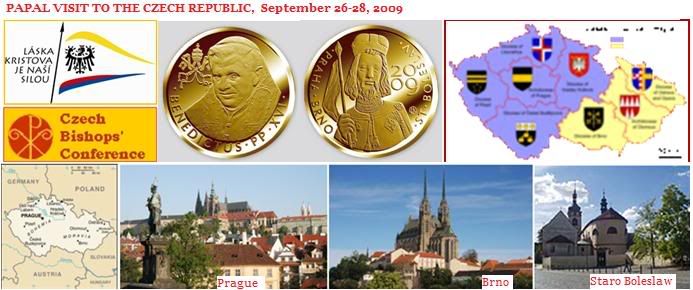 Day 2 - ECUMENICAL MEETING
Day 2 - ECUMENICAL MEETING
Archbishop's Palace
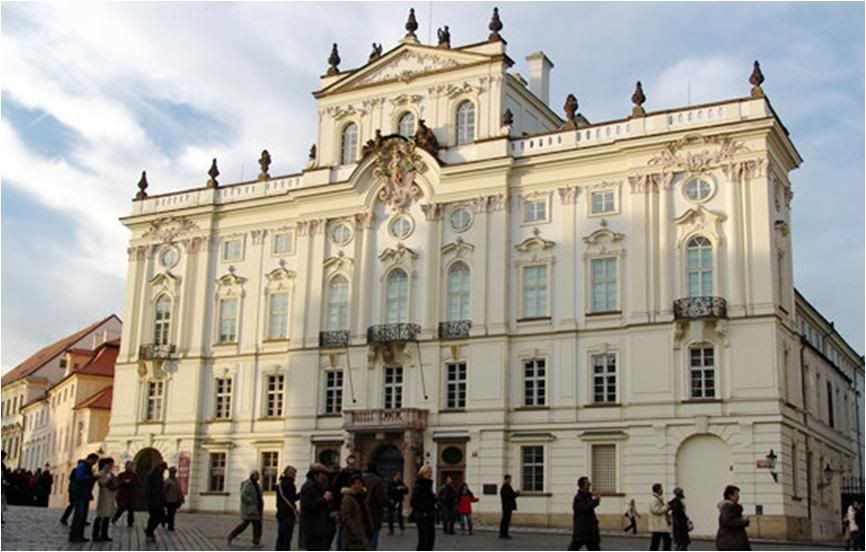
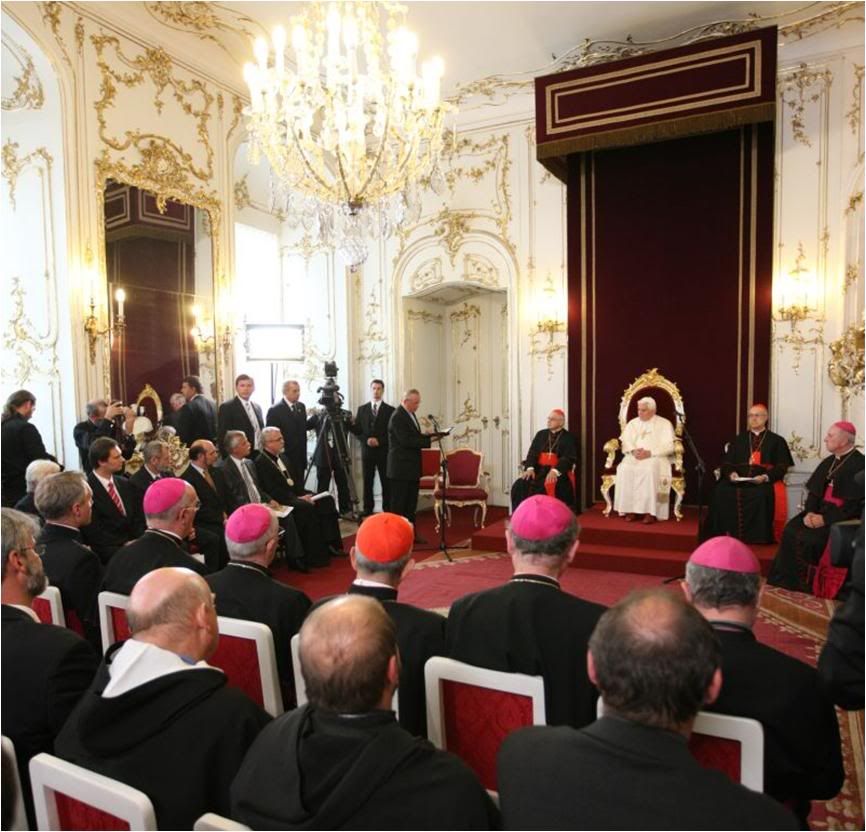
The Holy Father met this afternoon with representatives of other Christian churches in Czechoslovakia at the Throne Room of the Archbishop's Palace in the Prague Castle complex.
Italian news agencies are reporting that there were also two Jewish leaders among those who attended. Here is the text of the Pope's address delivered in English:
THE POPE'S ADDRESS
Dear Cardinals,
Your Excellencies,
Brothers and Sisters in Christ,
I am grateful to Almighty God for the opportunity to meet with you who are here representing the various Christian communities of this land.
I thank Doctor Černý, President of the Ecumenical Council of Churches in the Czech Republic, for the kind words of welcome which he has addressed to me on your behalf.
My dear friends, Europe continues to undergo many changes. It is hard to believe that only two decades have passed since the collapse of former regimes gave way to a difficult but productive transition towards more participatory political structures.
During this period, Christians joined together with others of good will in helping to rebuild a just political order, and they continue to engage in dialogue today in order to pave new ways towards mutual understanding, cooperation for peace and the advancement of the common good.
Nevertheless, attempts to marginalize the influence of Christianity upon public life – sometimes under the pretext that its teachings are detrimental to the well-being of society – are emerging in new forms. This phenomenon gives us pause to reflect.
As I suggested in my Encyclical on Christian hope, the artificial separation of the Gospel from intellectual and public life should prompt us to engage in a mutual “self-critique of modernity” and “self-critique of modern Christianity,” specifically with regard to the hope each of them can offer mankind (cf. Spe Salvi, 22).
We may ask ourselves, what does the Gospel have to say to the Czech Republic and indeed all of Europe today in a period marked by proliferating world views?
Christianity has much to offer on the practical and ethical level, for the Gospel never ceases to inspire men and women to place themselves at the service of their brothers and sisters. Few would dispute this.
Yet those who fix their gaze upon Jesus of Nazareth with eyes of faith know that God offers a deeper reality which is nonetheless inseparable from the “economy” of charity at work in this world (cf. Caritas in Veritate, 2): He offers salvation.
The term is replete with connotations, yet it expresses something fundamental and universal about the human yearning for well-being and wholeness.
It alludes to the ardent desire for reconciliation and communion that wells up spontaneously in the depths of the human spirit. It is the central truth of the Gospel and the goal to which every effort of evangelization and pastoral care is directed.
And it is the criterion to which Christians constantly redirect their focus as they endeavour to heal the wounds of past divisions. To this end – as Doctor Černý has noted – the Holy See was pleased to host an International Symposium in 1999 on Jan Hus to facilitate a discussion of the complex and turbulent religious history in this country and in Europe more generally (cf. Pope John Paul II, Address to the International Symposium on John Hus, 1999).
I pray that such ecumenical initiatives will yield fruit not only in the pursuit of Christian unity, but for the good of all European society.
We take confidence in knowing that the Church’s proclamation of salvation in Christ Jesus is ever ancient and ever new, steeped in the wisdom of the past and brimming with hope for the future.
As Europe listens to the story of Christianity, she hears her own. Her notions of justice, freedom and social responsibility, together with the cultural and legal institutions established to preserve these ideas and hand them on to future generations, are shaped by her Christian inheritance. Indeed, her memory of the past animates her aspirations for the future.
This is why, in fact, Christians draw upon the example of figures such as Saint Adalbert and Saint Agnes of Bohemia. Their commitment to spreading the Gospel was motivated by the conviction that Christians should not cower in fear of the world but rather confidently share the treasury of truths entrusted to them.
Likewise Christians today, opening themselves to present realities and affirming all that is good in society, must have the courage to invite men and women to the radical conversion that ensues upon an encounter with Christ and ushers in a new life of grace.
From this perspective, we understand more clearly why Christians are obliged to join others in reminding Europe of her roots. It is not because these roots have long since withered. On the contrary! It is because they continue – in subtle but nonetheless fruitful ways – to supply the continent with the spiritual and moral sustenance that allows her to enter into meaningful dialogue with people from other cultures and religions.
Precisely because the Gospel is not an ideology, it does not presume to lock evolving socio-political realities into rigid schemas. Rather, it transcends the vicissitudes of this world and casts new light on the dignity of the human person in every age.
Dear friends, let us ask the Lord to implant within us a spirit of courage to share the timeless saving truths which have shaped, and will continue to shape, the social and cultural progress of this continent.
The salvation wrought by Jesus’s suffering, death, resurrection and ascension into heaven not only transforms us who believe in him, but urges us to share this Good News with others. Enlightened by the Spirit’s gifts of knowledge, wisdom and understanding (cf. Is 11:1-2; Ex 35:31), may our capacity to grasp the truth taught by Jesus Christ impel us to work tirelessly for the unity he desires for all his children reborn through Baptism, and indeed for the whole human race.
With these sentiments, and with fraternal affection for you and the members of your respective communities, I express my deep thanks to you and commend you to Almighty God, who is our fortress, our stronghold and our deliverer (cf. Ps 144:2). Amen.
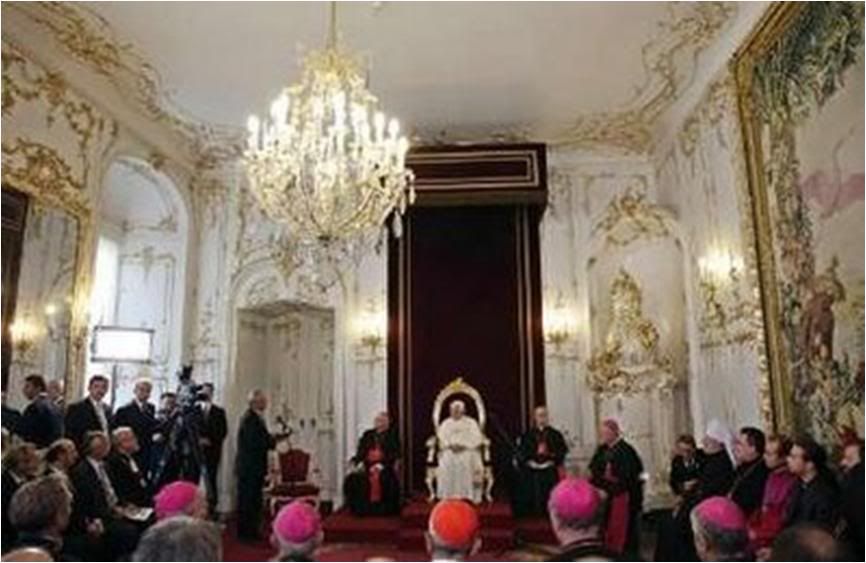
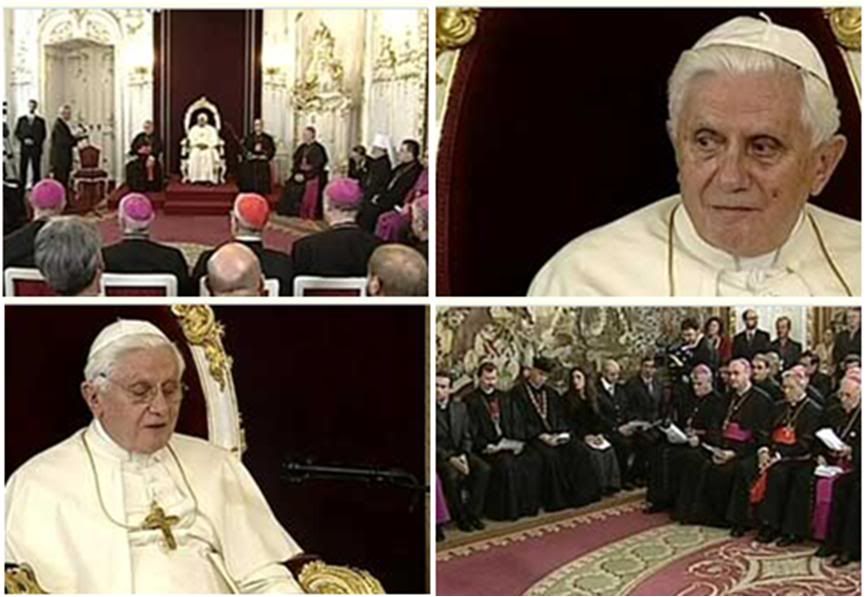 Benedict XVI confronts
Benedict XVI confronts
the ghost of Jan Hus
By JOHN L. ALLEN JR.

Sept. 27, 2009
Prague - Though lengthy volumes have been written about Christian history in the Czech lands, the casual observer really only needs two words to understand the striking ambivalence that Catholicism often evokes here: Jan Hus.
In America, “Good King Wenceslas” is probably the single most famous figure from Czech history, owing largely to the popular Christmas carol.
His memory lives on here too, but more commonly it’s the medieval preacher Jan Hus who is lionized as the real father of the Czech nation and the embodiment of its virtues.
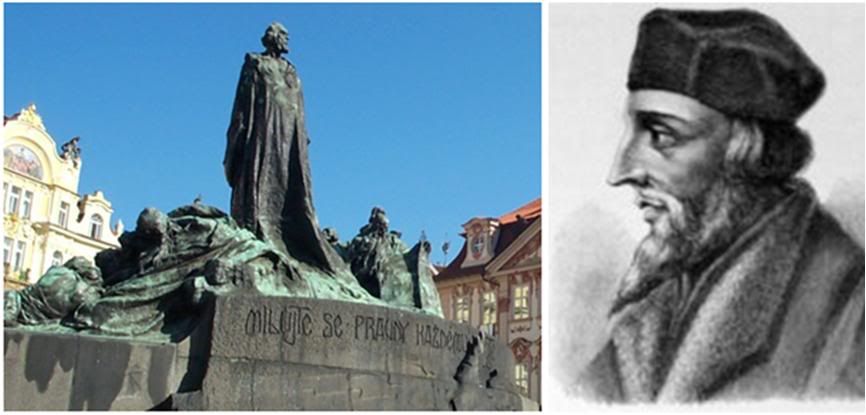 The Hus monument in Prague's Old Town. He lived from 1372-1485.
The Hus monument in Prague's Old Town. He lived from 1372-1485.
The fact that Hus was burned at the stake by the Catholic church in 1415 goes a long way toward explaining why, for some locals, being Czech and being hostile to Catholicism are practically the same thing.
Even the most avowedly atheistic Czechs celebrate Hus as a nationalist founder. Ted Turnau, who teaches the sociology of religion at Charles University, says that in Czech schools still today, Hus is often presented as the father of the nation, and of resistance to outside domination, with only scant mention of his religious views.
Born in 1372 in Bohemia, Hus is widely acknowledged as a forerunner of the Protestant Reformation, sort of a prototype for Martin Luther. He encouraged reading the Bible in Czech, condemned the medieval practice of indulgences, and insisted that “the church” is not merely the hierarchy but the entire fellowship of believers.
Summoned to the Council of Constance to face charges of heresy, Hus refused to recant and was executed on July 6, 1415.
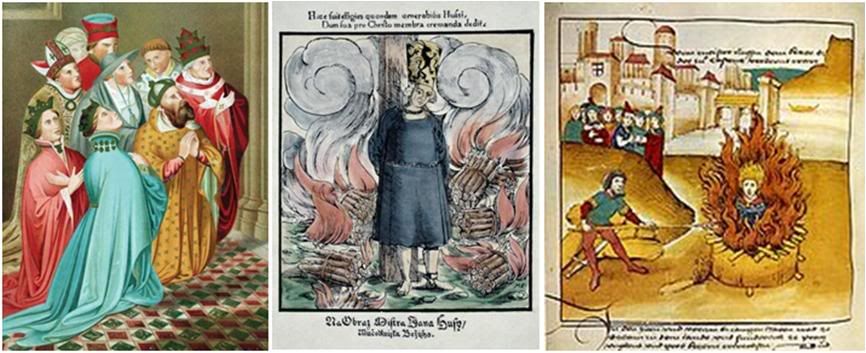 Cartoons illustrating the Council of Constance which condemned Hus to die at the stake, and Hus burning at the stake, have been popular since his death.
Cartoons illustrating the Council of Constance which condemned Hus to die at the stake, and Hus burning at the stake, have been popular since his death.
Several leading Christian denominations in the country trace their origins to Hus, including, naturally, the Hussite Church. Hus’s martyrdom has long been a sticking point, not only in ecumenical relations, but in broader tensions between Czech society and the church.
Prague’s Cardinal Miloslav Vlk has played a lead role in trying to heal that wound. Beginning in 1993, Vlk chaired a commission that studied Hus’s life and legacy, with an eye towards reevaluation. In 1995, Vlk became the first official representative of the Catholic church ever to attend a memorial of Hus’s death, held at the Bethlehem Chapel where Hus preached from 1402 to 1412. One year later, Vlk expressed regret in the name of all Czech Catholics for Hus’s death.
Those efforts culminated in a three-day symposium dedicated to Hus in Rome in 1999, when Pope John Paul II issued a historic apology for his “cruel death” and praised him for his “moral courage.”
That history formed the backdrop to Pope Benedict XVI’s meeting this afternoon in Prague with leaders of other Christian churches in the Czech Republic, held at the headquarters of the Archdiocese of Prague.
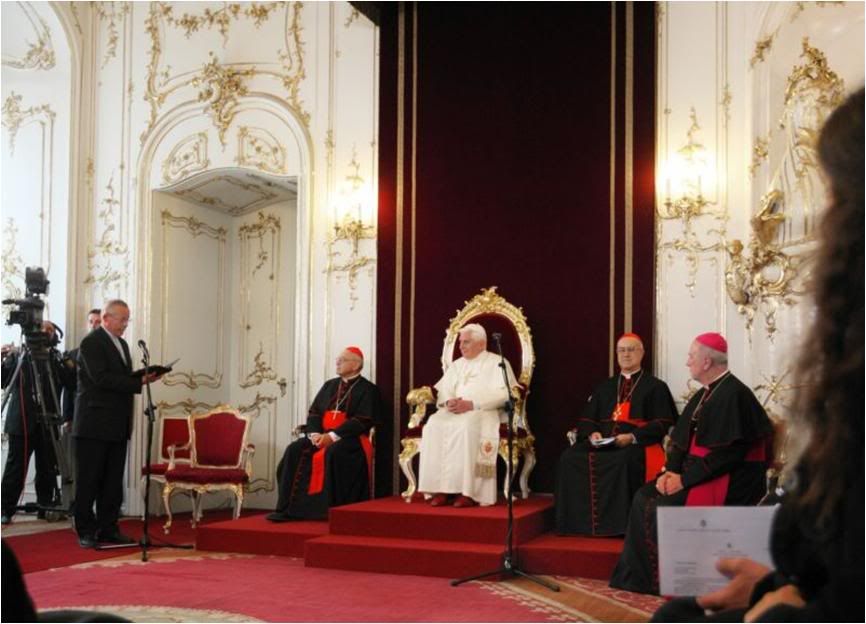
In welcoming the Pope, Pavel Černý, a theologian with the Church of the Brethren and president of the Ecumenical Council of Churches in the Czech Republic, reminded Benedict that “for centuries, the figure of Jan Hus divided the churches and also the perception of history.”
He thanked the Catholic Church for the initiative of Pope John Paul II, which, Černý said, brought “his character and his struggle for the truth” to light, “which still has something to say for our struggles today.”
As expected, Benedict alluded to the need to “heal the wounds of the past,” and specifically referred to the 1999 Rome symposium on Hus.
“I pray that such ecumenical initiatives will bear fruit not only in order to persevere on the path to Christian unity, but for the good of the entire European society,” the pope said.
Benedict did not, however, offer any new apology for the death of Hus, or announce any new evaluation of Hus as a reformer.
In general, Benedict’s remarks to the ecumenical leaders were focused more on the present than the past. In the teeth of social currents that the Pope said are trying to “marginalize the influence of Christianity in public life,” he called on all Christians to join forces.
Christianity must present itself, Benedict said, as offering “the spiritual and moral support that allows a meaningful dialogue with persons of other cultures and religions.”
European Christians, the Pope suggested, have a particular contribution to make in that regard.
“When Europe sits down to listen to the story of Christianity, it hears its own story,” Benedict said. “Its notion of justice, liberty and social responsibility, together with the cultural and legal institutions created to defend these ideas and to transmit them to future generations, have been shaped by its Christian legacy.
“In truth, its memory of the past animates its aspirations for the future,” Benedict said.
In effect, the Pope’s calculation seemed to be that the best way for Catholics and the spiritual sons and daughters of Jan Hus to overcome their troubled past is to concentrate on common efforts in the here-and-now.
[But that has been Benedict XVI's consistent line on ecumenical, inter-religious and inter-cultural relations!
In this regard, the Orthodox Churches have been the most practical and open to immediate concrete collaboration among churches. Possibly because compared to Protestants and Jews who have so many rival denominations and are divided among themselves.
Muslims are limited in what they can do because they do not have central authority whose word can be accepted by all of them, and each imam with a mosque appears to have his own little autonomous jurisdiction where his word is law.]
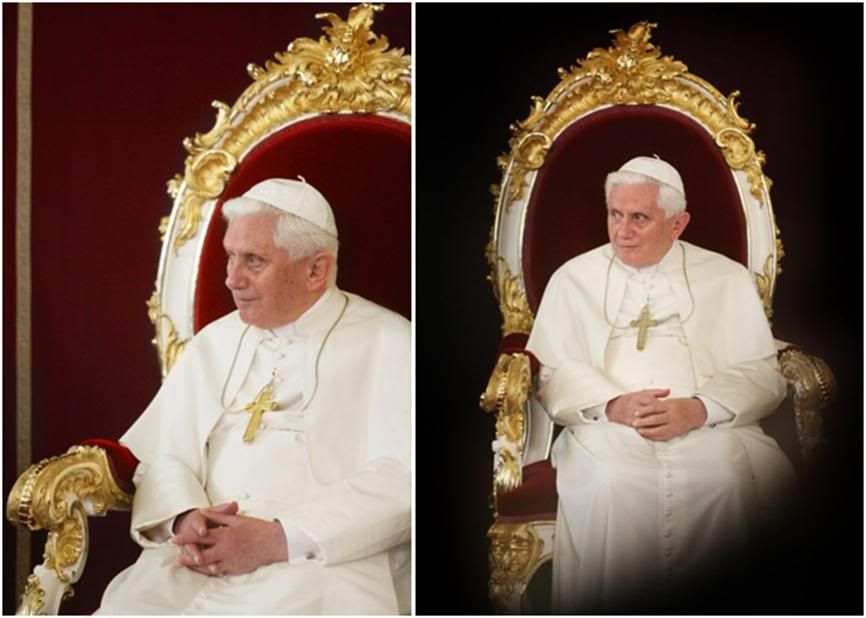
[Modificato da TERESA BENEDETTA 29/09/2009 02:43]